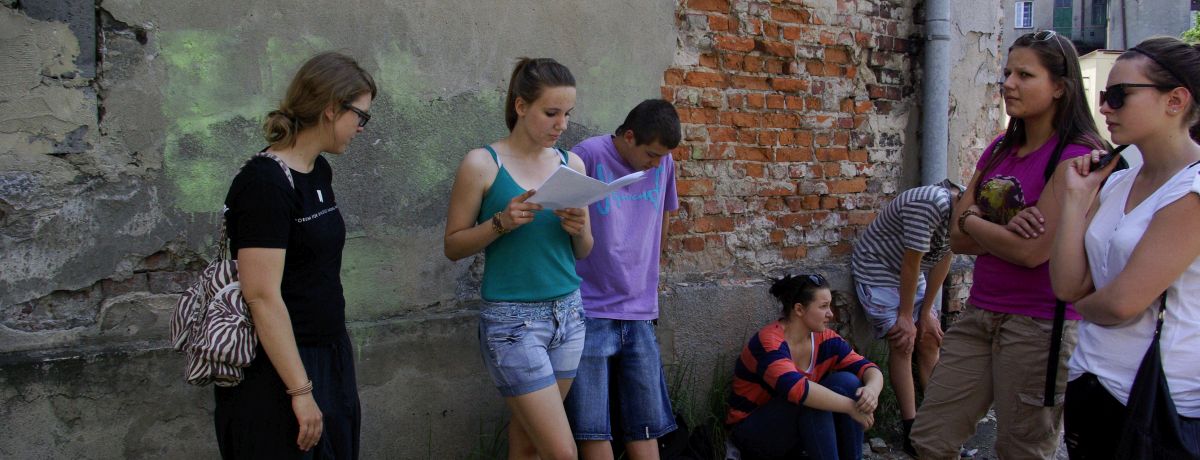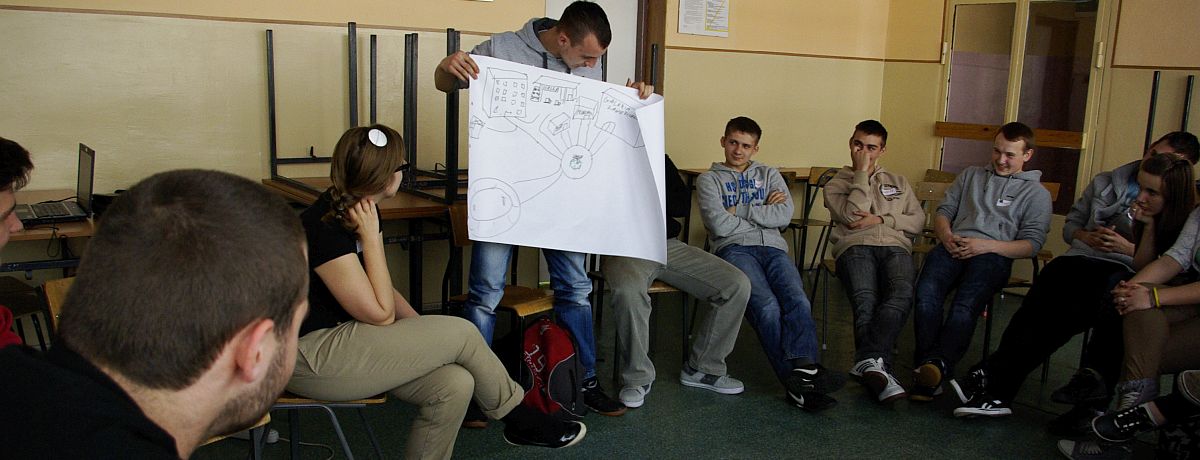| 2012 |
Zawiercie
Xavery Dunikowski School Complex


| 2012 |
Zawiercie is one of those places where the School of Dialogue program was truly needed. In this industrial town the Jewish cemetery is closed in fear of devastation of headstones, and bricks falling of a ruined synagogue building constitute a threat to passers-by. At the end of the 19th century, Jews constituted one-fifth of the town’s population. They owned shops, craft workshops, factories, banks. In 1940, after the Nazis had entered the town, Jews from Zawiercie and surrounding areas were closed in a ghetto. At the turn of 1941 and 1942, a factory manufacturing uniforms for aviation forces was established in Zawiercie, where over 4,000 Jews were forced to work. During the two liquidations of the ghetto in Zawiercie, i.e. in 1942 and 1943, approximately 6,000 to 7,000 Jews were transported to the Auschwitz-Birkenau concentration camp.
The workshops organized by the School of Dialogue were conducted in Zawiercie unlike in other places.
Forum for Dialogue educators, full of enthusiasm and belief in huge capabilities of young people, met a group of a vocational technical school students composed for the most part of self-confident boys. During the meetings, educators put the workshops program aside and started discussion. About anti-Semitism, national minorities, nationalism. It caught students attention, therefore they joined the discussion and listened. Those who stayed until the end of the workshops started to show some progressive changes in them. Thanks to the initiative of a teacher, Jolanta Stefańska, some of them headed to seek information concerning Jews of Zawiercie. They visited two Jewish cemeteries in Zawiercie and Kromołów, also went to the former ghetto area, and Jolanta Stefańska told them the history of the local Jewish community.
A dozen or so students, mainly girls, decided to participate in the project completing their involvement with the School of Dialogue program.

Six weeks after commencing the workshops, they organized a walking tour following the footsteps of Jews who once lived in Zawiercie, to which they invited fellow students.
The cemetery was the first stop along the route. The visit was possible thanks to Mr Marcin Bergier, a caretaker of the cemetery and history teacher, who willingly completed the information provided by the students. They talked about the history of the cemetery and symbols placed on matzevot. They talked about the tree of life, the damaged ohel of rabbi Izrael Lejb Ben Jakub and the monument in the memory of the murdered built in 1998. After entering their names into the commemoration book kept for the cemetery, they went to Marszałkowska Street. They saw the synagogue building, devastated by the Nazis in 1945, and later changed into a household appliance shop, today empty and not in use. Students showed to the tour participants photographs of the synagogue cantors from 1925 and a picture of a fragment of the Torah taken out of the synagogue after liquidation of the ghetto.
At the end of the tour, students went to the former ghetto area which included Hoża, Jasna, Apteczna, Porębska, Marszałkowska, Ciemna Streets as well as Stary Rynek and Nowy Rynek. Here, students found out about the fate of Jews imprisoned in the ghetto. About those who altered and sew Wehrmacht uniforms at the Luftwaffe factory; about those who worked at the Erbe’s steel plant and those who were forced to clean the streets and who were later transported to Auschwitz. Two boys managed to escape. Seven men from the Luftwaffe factory survived. The others never returned to Zawiercie…
Participation in the School of Dialogue program gave students from the vocational technical school in Zawiercie something to ponder about. It was the first time that they came across Jewish culture and a sincere and substantial discussion about their definite attitudes.
After the workshops, they wrote that to some degree these meetings changed their perspective, broadened their knowledge and allowed them to understand certain things.
School:
Xawery Dunikowski School Complex
Students:
1st year students
Teacher:
Jolanta Stefańska
Educators:
Aneta Ceglarek, Anna Desponds

In appreciation to the Conference on Jewish Material Claims Against Germany (Claims Conference) for supporting this educational program. Through recovering the assets of the victims of the Holocaust, the Claims Conference enables organizations around the world to provide education about the Shoah and to preserve the memory of those who perished.

In appreciation to Friends of the Forum for supporting the School of Dialogue educational program.
